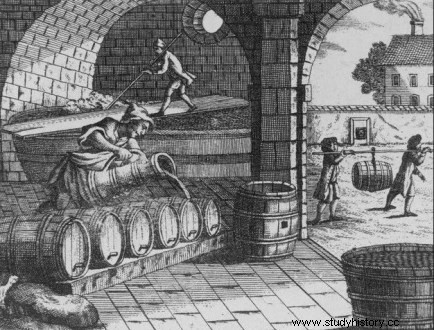
British imperialism
After the Seven Years' War, British authorities began to reflect on the British Empire at its height. Between 1770 and 1782, the Tories in power dreamed of strengthening colonial domination and reinforcing centralization. Proponents of protectionism, they sought to strictly enforce the mercantilist system by strengthening the commercial monopoly, encouraging shipping companies and fighting against the contraband trade. The Tories faced opposition from the Whigs, who favored free trade, but also from American merchants.
In America, local laws, made by assemblies and confirmed by the king, were in principle inferior to British laws, passed by the British Parliament. However, the colonial assemblies did not hesitate to encroach on the prerogatives of the governors by using their right of inspection. Faced with the rise of the "regime of assemblies", London sought to strengthen its authority after 1763. The metropolis then feared an expansion of the thirteen colonies towards the West which would have created an imbalance and led to independence.
Economic litigation
The economy of the colonies was marked by mercantilism and exclusivity:through this system, Great Britain intended to keep as much precious metal as possible and to protect British industry and craftsmanship. Trade relations were regulated by Navigation Acts:the colonies exported raw materials on British vessels. They were processed in Great Britain and then sold abroad. Products manufactured in the colonies were not to be exported and some goods even had to come from the metropolis. In return, the American colonies were to buy only British goods. Foreign ships that traded with the colonies had to pass through a British port in order to pay customs duties.
In reality, the distance from the metropolis and the corruption of customs officers in America led to a certain laxity in the collection of taxes. American ships even crossed the North Atlantic illegally for the purposes of trade. This distortion of mercantilism and this American competition quickly worried British merchants. The economic development of the thirteen colonies aroused a certain animosity between the colonial merchants and the capitalists of the metropolis.
American settlers, especially New England merchants, denounced the monopoly on the traffic of certain goods such as tea. They also regretted the chronic lack of money and their dependence on British credit.
Emergence of an American identity
The American economic elite often felt close to the metropolis and sought to emulate the upper classes who lived in Britain. These great families sent their sons to study in Great Britain. They had an interest in remaining within the fold of the metropolis, because of the mercantilist system and the order it guaranteed.
The middle classes were less attached to Britain. American-born settlers felt less and less British. Also, despite the diversity of the colonies and their inhabitants, the British imperialist policy gave rise to a “colonial patriotism” turned against the metropolis and the formation of an American identity. Since the 17th century, the colonies had finally asserted themselves as an island of relative religious tolerance which contrasted with the European situation. The aspiration to happiness and individual success, linked to social mobility and the opportunities offered by the vast North American space, was one of the foundations of this American identity in formation.
However, the dissensions between colonists and between the colonies were very numerous. Disputes over settlement boundaries were frequent. Within the same colony, interests diverged. In Massachusetts, the people of Boston oppose the farmers of the western colony. The settlers were procedural and constantly sued each other. This disorder did not prevent the cause of independence from gaining ground as the colonists believed that the decline in virtue was due to British oppression. John Dickinson believed that private interest had plunged the English into domestication and abasement of spirit.
Influence of Enlightenment
At the end of the 18th century, Philadelphia was the "true center of the revolutionary Enlightenment", notably under the impulse of the scholar Benjamin Franklin (1706-1790). The city was, with Boston, the main publishing center of the thirteen colonies and the Pennsylvania Gazette (1723) played a major role during the American Revolution. The American Philosophical Society was a discussion group founded by Benjamin Franklin.
The elites and fathers of the American Revolution read European philosophers such as John Locke, Charles de Montesquieu, Hugo Grotius, Cesare Beccaria, Henry Home or Thomas Hobbes.
The theories of the British philosopher John Locke influenced the actors of the American Revolution the most:the idea of the social contract implied the natural right of the people to depose their leaders. On the other hand, historians have found few traces of Rousseauist thought in America. The Fathers of the American Revolution drew on Montesquieu's analysis of the British constitution, but also on British texts (Habeas Corpus, Declaration of Rights) to draft the constitutions of the States and the country.
Republicanism was one of the dominant ideological principles in the colonies on the eve of the revolution. The colonists criticized the ostentatious luxury of the court and proposed a republican virtue. The idea that men had a civic duty to fight for their country developed.
